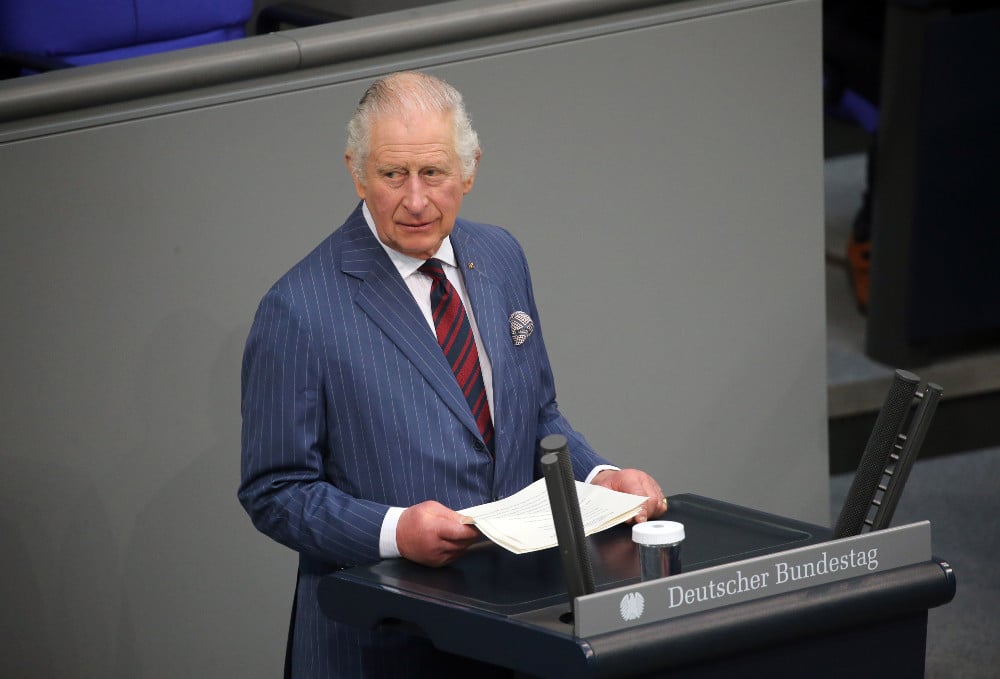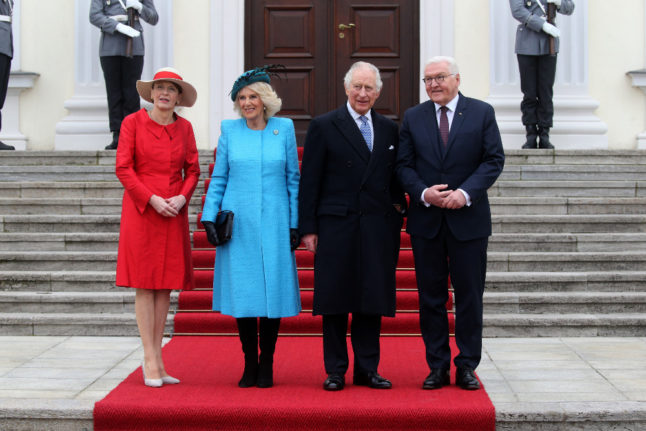Germans love a foreign guest who can speak German — even just a little bit.
Unlike some other countries, where it might take a lot more fluency to impress your hosts, a few words of greeting in German are often likely to go a long way with Germans. King Charles, known to speak German with some fluency, clearly understood this after arriving in Berlin for his first state visit as King.
“It’s very nice for you all to have come and not left me alone for a ‘Dinner for One,’” the King said to his laughing German hosts at Wednesday’s state dinner, referring to the German tradition of watching the British sketch of the same name on New Year’s Eve.
“I’ve established that I’ve actually been to Germany more than forty times,” he told his dinner guests, before demonstrating that he wasn’t done with the jokes. “That naturally shows how important I consider our relationship, but also, I fear, how long I’ve been around.”
READ ALSO: ‘New chapter’: Charles III in Germany for first foreign trip as king
Shortly after his second wisecrack, he continued his dinner speech in English. But German parliamentarians were treated to another display of King Charles’ German chops during his address to the Bundestag on Thursday — the first such address for a reigning British monarch.
This time though, he was more serious — and his vocabulary more advanced. More than giving the opening remarks in German, King Charles also switched back and forth between English and German several times throughout the speech.
During the first part of his speech — in which he spoke entirely in German for around four minutes, King Charles opened by saying “there is hardly a better place than this building to show the history of the 20th century. It demonstrates in itself what connects our two countries,” he said.
“In 1933, it was set on fire. In 1945, heavily damaged. In the 1990s, the parliament of a reunified, democratic Germany would be reconstructed by a British architect.”
Continuing in German, King Charles thanked his hosts for his previous invitation to speak before the Bundestag in 2020 — a speech which he also gave partially in German.

READ ALSO: Charles warns Europe’s security under threat in landmark speech in German
Not a beginner in the language
Beyond the lighthearted German greetings he gave during his state dinner, King Charles’ Bundestag address shows that he is at least familiar with advanced German vocabulary.
During the German parts of his speech, he referred to Germany and the UK’s common goal to support Ukraine, the inspiration the women’s football team in both countries had given to the next generation, and climate change.
A German learner’s knowledge of these topics would typically be tested in classes at the B2 or even C1 level, suggesting the British monarch’s vocabulary level is at least at an upper intermediate level—if not at an advanced level.
Of course, the speech itself was likely written — and certainly proofread — for him. He also likely had the chance to practice it beforehand. Even so, King Charles did stumble over a few words and speaks German with a noticeable English accent.
That said, he clearly understands what he’s saying.
The German vocabulary he uses when speaking also doesn’t always involve the simplest word choice a German speaker could use on some of the weightier topics he discussed.
He also has a certain sense of timing necessary to make jokes land — something even advanced German speakers can struggle with at times.
Obviously, reading a prepared speech — even one that uses a lot of advanced vocabulary—is easy compared to listening to an advanced lecture, reading a novel, or having a spontaneous conversation about politics or another advanced topic.
Whether King Charles is good enough to have a long impromptu chat with his German hosts isn’t so clear to us — the public.
But he’s certainly not a novice.
The German media is left impressed
German newspapers had a few complementary headlines about King Charles’ German. “Standing Ovations for Charles Bundestag speech in German” read one headline in Bild, Germany’s highest circulating tabloid newspaper.
“With an accent, but without mistakes: why King Charles can speak German so well,” read another piece in Berlin’s Der Tagesspiegel.
Bei seiner Rede im Bundestag beeindruckte König Charles III. mit seinen Deutsch-Kenntnissen. Woher kann der Monarch das so gut? https://t.co/7FNwUfJb9i
— Tagesspiegel (@Tagesspiegel) March 30, 2023
As this piece notes, it’s not clear exactly where King Charles picked up German, noting that he took French and history during his UK A-Levels, rather than German. Some say that the King has a knack for languages, famously giving part of his 1969 inauguration speech as Prince of Wales in Welsh – a language even more difficult than German.
However, his father. Prince Philip, was known to speak German at or near a native level — and all of Prince Philip’s sisters married into German aristocracy.
King Charles thus has many German cousins on his father’s side, while his mother’s side also has many German relations. In 1947, Prince Philip’s sisters, just two years following WWII, were banned from his wedding to Britain’s then Princess Elizabeth.
As the state dinner Wednesday, many of King Charles’ German cousins accepted invitations to dine with him, in another symbolic sign of reconciliation.
READ ALSO: What are the German roots of the British royal family?




 Please whitelist us to continue reading.
Please whitelist us to continue reading.
Member comments